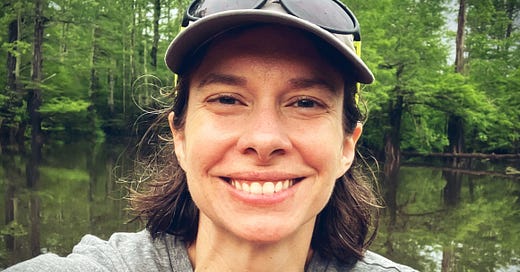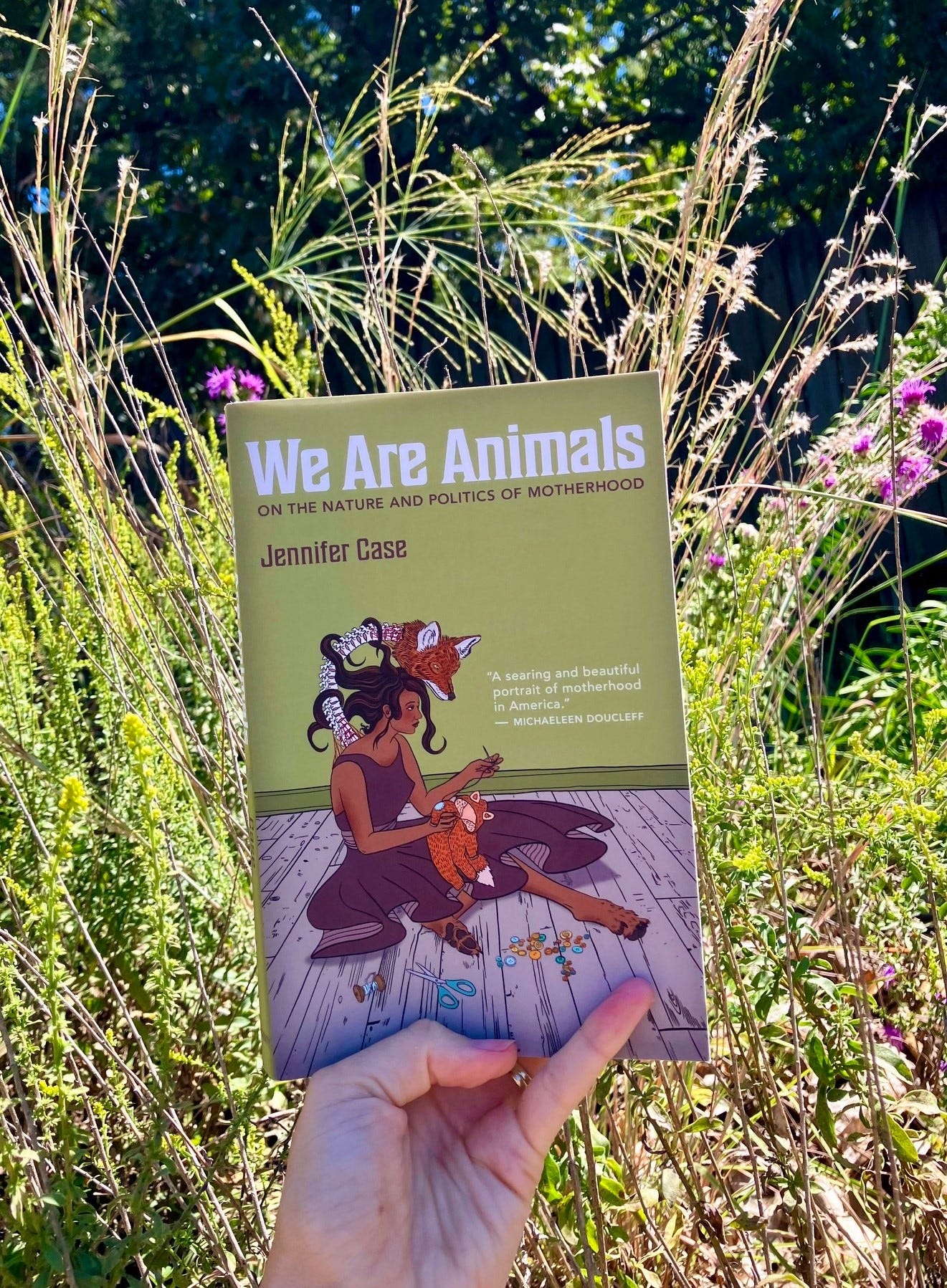Grounded, Compassionate, And (Hopefully) Wise.
The Body, Brain, and Books: Eleven Questions with writer, gardener, mother, and teacher Jennifer Case
Welcome to another edition of The Body, Brain, & Books. If you enjoy reading these quick, insightful interviews brimming with wisdom and hope, please subscribe to Beyond.
Jennifer Case is the author of We Are Animals: On the Nature and Politics of Motherhood (Trinity University Press, 2024) and Sawbill: A Search for Place (University of New Mexico Press, 2018). Her essays have appeared widely in journals such as The Rumpus, Orion, Ecotone, Literary Mama, and North American Review, among others. She teaches at the University of Central Arkansas and serves as an assistant nonfiction editor at Terrain.org. You can find her at www.jenniferlcase.com.
What are you reading now?
I’m slowly making my way through Rick Rubin’s The Creative Act. Otherwise, I’ve been reading a lot of spiritual writing alongside new creative nonfiction.
What are your most beloved books from your youth? Did you ever hide any from your parents?
As a teenager, I loved Chaim Potok’s Davita’s Harp and Annie Dillard’s Pilgrim at Tinker Creek. I don’t remember hiding books from my parents, but I do remember surreptitiously reading late into the night with a flashlight, and quickly turning it off and feigning sleep when I heard my parents’ footsteps.
What’s your favorite book to reread? Any that helped you through a dark time?
Unless I’m teaching them, I don’t often reread books. I treasure favorite books, and keep them in honored spots, but I rarely reread them—almost as if I am trying to protect the memory of my original reading experience. That said, the list of books that have helped me through dark times is endless! Sometimes, it seems like we find the right books at just the right moments.
A few of the books that have stayed with me recently include Stephanie Clare Smith’s Everywhere the Undrowned, Kerri Ní Dochartaigh’s Thin Places, Thich Nhat Hanh’s Zen and the Art of Saving the Planet, and Joanna Macy’s World as Lover, World as Self.
What’s an article of clothing that makes you feel most like you?
A “Root Down” t-shirt from The Land Institute. I love everything about prairie plants and how deep their roots go into the earth. I’m also really inspired by prairie restoration efforts and regenerative agriculture. The shirt captures all of that and reminds me of the need to stay grounded.
What’s the best piece of wisdom you've encountered recently?
A friend recently recommended Pema Chödrön’s audio book, The Fearless Heart, to me. The book is about working with strong emotions such as guilt or shame, and the advice Chödrön gives is to “drop the story, but stay with the energy.” I’ve been experimenting with that, and it’s hard, but it helps!
Tell me about any special relationship you’ve had with an animal, domestic or wild?
A critter has lived in the ceiling above my office at work for over three years. I’m not entirely sure what it is—a squirrel, mouse, raccoon, rat, etc.—but it spends a lot of time skittering across the ceiling tiles, and sometimes in the walls. When it does, its feet sound like someone clicking away at a keyboard. I’ve occasionally heard the critter and mistaken it for my colleague, typing in the office next to me. The maintenance department has tried to set traps multiple times, but the critter has foiled them. At this point, I think everyone has given up. I’m glad. The critter and I have never met face-to-face, but it feels like we know each other. I’ll be sad if the ceiling ever goes silent.
What's one thing you are happy worked out differently than you expected?
My essay collection, We Are Animals: On the Nature and Politics of Motherhood, just came out this fall, even though I effectively finished the book in 2018. I remember the burst of energy I had from 2019-2020 when I started to seek an agent or a publisher. I hoped the collection would land quickly, in time to offer a timely response to legislation on reproductive justice. When I kept experiencing set-backs (covid’s impact on publishing, an agent who dropped me and her other nonfiction clients, etc.), I worried the book had lost its moment. Today, however, I’m really thankful the book didn’t come out until now. It’s been great working with Trinity University Press, and I recognize that I’m much better prepared to handle the book’s vulnerability now than I was four years ago.
Singing in the shower or dancing in the kitchen? Or another favorite way your body expresses itself?
I don’t sing or dance, but when I am feeling really joyful, I’ll spontaneously do yoga poses. My family has often found me doing half-moon in the kitchen while preparing dinner.
What are your hopes for yourself?
To do meaningful work, and to stay grounded, compassionate, and (hopefully) wise.
What’s a kindness that changed your life?
I was in a car accident my last semester of college as an undergraduate. I rolled a van one and a half times on the interstate, landing upside down. Although no one was physically hurt, the aftermath hit me hard. I stopped sleeping, couldn’t eat, had trouble focusing, etc. I knew I was struggling, but I didn’t know who to talk to. I remember walking past the counseling center on my campus and thinking, “I wonder if I should go there…” But I never did. What I did do was write poem after poem after poem about the experience in the journal I was supposed to keep for my poetry class. I felt guilty—the poems were all so raw, and not my best work—but it was the only thing I could think of to write.
One day, my poetry professor pulled me aside for a conference, saying he’d read the journal and had been wanting to talk to me. He also said, in a kind, but very straightforward voice, “You could have died.” It was a brief conversation, but the fact that he noticed, took the time to reach out, and spoke back what I was struggling to accept, broke through the fog I was in. Now that I’m a professor, I hope I can do the same thing for my students when the need arises.
What’s a guiding force in your life?
I’ve really come to love the Buddhist concept of the bodhisattva—the spiritual being who has dedicated their life to relieving the suffering of others. To a degree, that goal is impossible—suffering will always exist—yet in Buddhism anyone can be a bodhisattva (including animals, trees, or entities such as the earth). My next writing project is about care work, and I’ve been thinking a lot about that: how writing, teaching, and ways of being can foster the kinds of connections that relieve suffering. It’s a beautiful aspiration.
If you enjoyed Jennifer’s questionnaire, you may also enjoy this one with Farrah Storr:
⭐️⭐️Beyond with Jane Ratcliffe is a reader-supported publication with the goal of bringing as much light as possible into this world of ours. If you look forward to reading Beyond, please consider becoming a paid subscriber.⭐️⭐️










The part about the car accident gave me chills because something similar happened to me in my youth and I just kept going. No counselor, no real discussion with anyone about the gravity <3 Years later a chiropractor brought it up after a X-ray. It was the first person who really saw what I’d been through. These first responders! Whether professorial or professional (or an amateur friend) 💓 I really relate to being drawn to bodhisattva energy. And congrats on your book!
This is a wonderful read: the story about the professor who read her work and really saw what was going on was very moving, especially as Jennie says it's what she now tries to do as a teacher ❤️